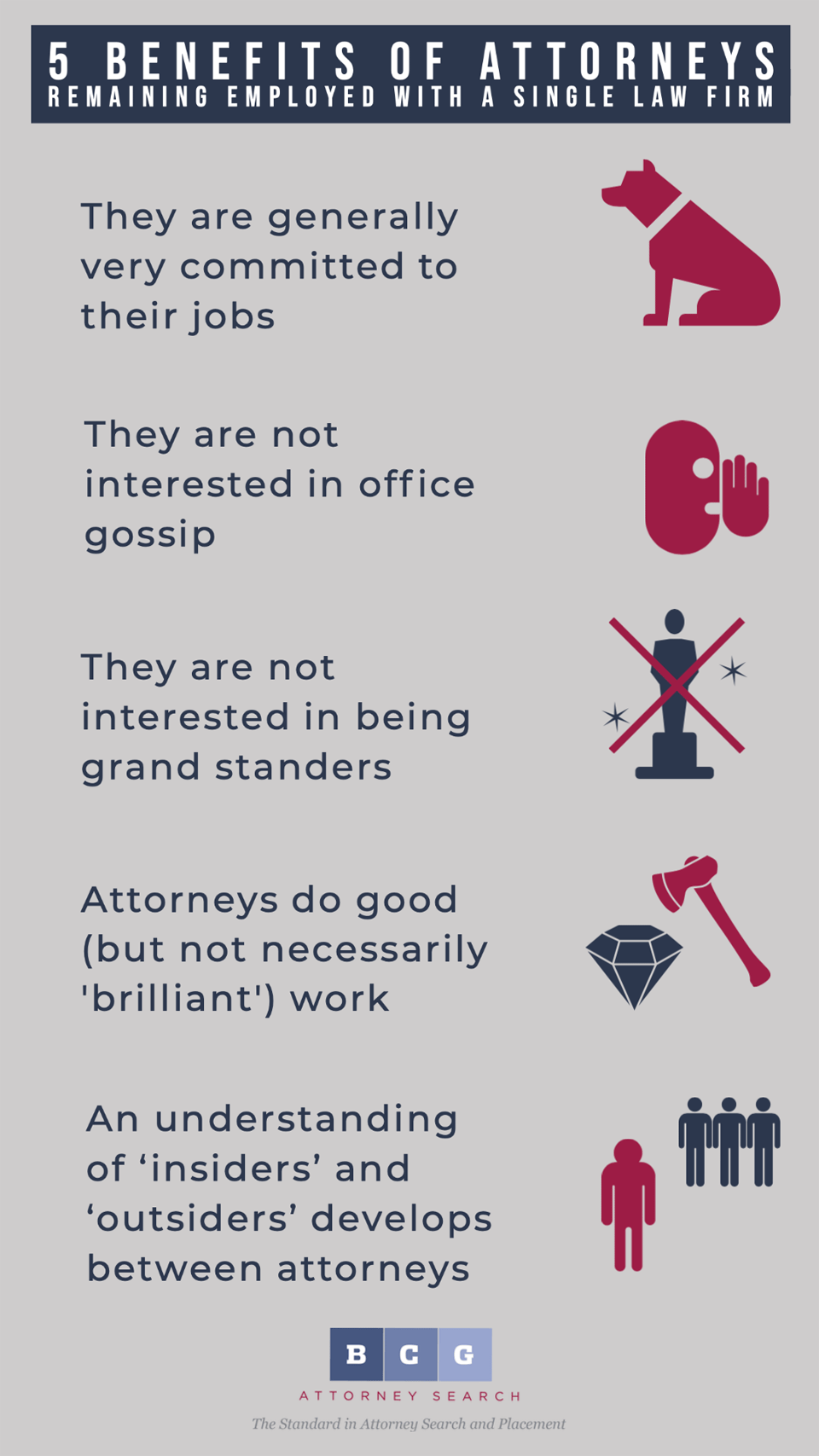
If you go into any firm that has been around more than twenty or thirty years, you will inevitably find a handful of attorneys who have been there from the very beginning of their careers. These well-adjusted souls will typically report to work each day at a similar time and have managed to be the only ones presumably left in the law firm after generation upon generation of attorneys coming and going.

|
| Harrison Barnes |
Many attorneys do last for decades in the same firm and there are characteristics which uniformly seem to characterize these sorts of attorneys. While I am a legal recruiter, I do have a great deal of respect for attorneys who in this day and age are able to "stay put" at the same firm for a long period of time and remain at a single firm throughout their careers. None of this is to say there are not really good and solid reasons for leaving a law firm or other legal environment if the going gets impossible. I am the first to admit that there are legal employment environments that can be intolerable for many. Nevertheless, you need to keep in mind that if a legal employer has been around for 30+ years, there is a chance the employer is doing something right. Before leaving, it is often wise to take inventory of yourself.

There are certain characteristics that tend to characterize attorneys who stick with the same legal employer for long lengths of time and also certain characteristics of this employment situation. These characteristics are discussed below:
1. Attorneys Who Remain With the Same Firm for Long Lengths of Time Are Generally Very Committed to Their Jobs
Many people were raised with the idea (or have the idea) that fidelity to an employer is something that is simply expected. The unwritten rule is that if you are not treated horribly, then there is really no reason you should ever end up leaving a job.
One of the saddest, but also the most refreshing things I have seen as a legal recruiter, is when I interview and meet with attorneys who have been with the same firm for 20 years or more and whose firms are going under or are in a position of being forced to look for other opportunities. When attorneys like this look for a new position, their rationale is most often that something profound has happened at the firm that is making their separation necessary. These attorneys appear as if they are going through a divorce or have just had a death of someone they are very close to. For these attorneys, leaving a position is something that would be unthinkable and only something they would consider in the event of a massive trauma.
This fidelity between employers and employees reminds me often of people who have been married 50 years or more. There is a mutual respect that comes out of this and a way of thinking that both need one another. I believe that this sort of thinking is really rare in this day and age. While this may not seem related to careers, a statistic I once saw in a social science class showed that as divorce rates went up in society so did rates of drug abuse, suicide and other associated societal ills. The bond between an employer and an employee is a powerful force that, in its best form, is much like the bond between a husband and wife with a very committed relationship. Both sides respect and accept one another for the most part unconditionally.
The attorney who is committed to their job is in many respects similar to someone who is committed to anything. There may be something else out there, but they have decided to remain loyal. This attitude is a very healthy one, I believe, and can also make these attorneys very settled. I know an attorney that was offered over $1,000,000 a year by a rival firm when he was making just barely above half of that. He was not interested in the money and was more concerned with the bond he had with his current firm. This is how it works when there is commitment on both ends.
See the following articles for more information:
2. Attorneys Who Remain With the Same Firm Are Not Interested in Office Gossip or Reasons Not to Succeed
In every organization, there are typically people who are not succeeding at their jobs. These people generally are not doing their work in a competent manner and are also often looking for ways to cut corners with their work. Most organizations will generally call out this behavior and then speak with the employee. Some employees correct their behavior and others simply get mad at the organization. Some employees may be mad at their organizations for no particular reason at all, or they may be angry with a previous organization and simply transfer their anger to their current employer. I remember a recruiter once telling me never to hire someone who had been fired from their last job. People who have been fired from their last job will typically take out their anger on their next organization he told me.
You need to understand that there are always going to be people in the organization who have a lot of anger towards their employers. These angry employees will start rumors, attempt to share their anger with others in the organization and often subtly (or not so subtly) forecast "gloom and doom" for their employer. This is how rumor mills get started and these rumor mills are prevalent in every legal organization there is for the most part.
Attorneys who remain with their employers generally do not participate in these rumor mills or even pay attention to them. At certain times in an employer's history, there are likely to be calls of "crisis" of seemingly epidemic proportions as lots of people leave, for example. At other times there will be other issues. The overwhelming characteristic of attorneys who remain at firms for long periods of time is that they generally pay no attention to these rumor mills whatsoever.
See the following articles for more information:
3. Attorneys Who Remain With the Same Firm for Long Periods of Time Generally Are Not Interested in Being Grand standers -They Are There to Do Their Jobs and Do Them Well
I once heard someone say that the most successful people are often the most screwed up. I am not sure if this is true, but there is some wisdom in every saying like this. Attorneys who are able to remain with the same employer for long periods of time are generally not concerned with "getting ahead" to the same extent as many other attorneys are. Many attorneys who are extremely concerned with getting ahead will often leave saying they are looking for better opportunities because they are interested in immediate advancement. In other cases, attorneys will try and show up various attorneys in their firm.
Attorneys who remain at their firms for long periods of time are generally most interested in just doing their jobs. They have faith in their organizations and that things will work out for them. They are not loud and do not go out of their way to attract attention. Their main concern is to simply do the best job possible.
What ends up happening to attorneys who remain focused on their work and not grandstanding is they end up getting ahead while other attorneys end up putting their foot in their mouth. When I first started practicing, I met an attorney who was first in his class from a major law school and the Editor-in-Chief of his school's law review. Everyone thought this particular attorney was really on his toes and someone likely to have major success at the firm. This attorney wrote articles in his spare time and argued with firm partners about the finer points of law (and was right when he argued). While this attorney was very smart, he thought he was so good that he ended up sabotaging his career in the long run when he called a newspaper to discuss a case he was working on and ended up being quoted on the front page of the Los Angeles Daily Journal. The fallout from this incredible incident caused the attorney to leave the law firm, and he never worked for a large law firm again.
This sort of incident aside, it is important to keep a moderately low profile in order to have long-term success in a law firm. It is never wise to raise your swords and capture the limelight. While someone can win a sword match for some time, they will eventually lose, and in a sword match (which your legal career could be compared to), the loss is usually permanent.
See the following articles for more information:
4. Attorneys Who Remain With Their Firms for Long Periods of Time Typically Do Good (But Not Necessarily 'Brilliant') Work
An attorney who remains at their firm for long periods of time typically has learned to "pace themselves" and manages to do work on a day-to-day basis that is good, but not necessarily extraordinary. This does not matter. I would estimate that the majority of the battle of being an excellent attorney is simply showing up. Sure, some people can do extraordinary work; however, the brightest flame is not always the longest burning flame. The ability to consistently show up and do the work is the most important aspect of being a long-term performer in a law firm.
The smartest attorneys out there are often the ones who end up having the most problems in the practice of law. Attorneys who can consistently show up for work and do an excellent job send the message to colleagues, clients and others that they have the ability to get the job done. In the end, it is all about getting the job done.
See the following articles for more information:
5. An Understanding of 'Insiders' and 'Outsiders' Typically Develops Between Attorneys Who Remain At Their Firms for Long Periods of Time
After an attorney has been with a law firm for an extended period of time, an understanding develops between that attorney and others who have been at the firm a long period of time. An institutional understanding develops. This understanding seems to say something to the effect of "people may come and go, but we are the ones who are committed to this organization, and we are the heart and soul of this place."A similar sort of understanding that develops is that "we owe each other because we have each demonstrated a commitment."
Bonds form between people who have been part of the same organization for long periods of time. These bonds are often invisible, but they are real bonds. These bonds are powerful and make the organization and forces within it come to the defense of those who are committed to the organization during times of organizational change and reorganization. These bonds are something that gets stronger over time as an organization changes. After some time, attorneys who have been with the firm for decades are simply treated as part of the very fabric of the firm and are virtually unquestioned.
See the following articles for more information:
Conclusions
While it may seem odd for a recruiter to write a story in defense of attorneys remaining with their firms, longevity with a firm is something that is meaningful in this day and age. There are many characteristics of attorneys who remain at their firms for long periods of time, and these characteristics, in my experience, are usually found in most attorneys who demonstrate this level of stability.
A final factor is that, in my experience, attorneys who remain with firms for long periods of time are often less tormented than the average attorney. By looking for reasons to like and respect their organization rather than find fault, they find themselves in organizations which ultimately welcome them.
It is always important to remember that if a law firm or other legal organization has been around for 20 years or more, the chances are it is doing some things very right. There will always be people who succeed in these organizations and, of course, always those who leave or fail.
Many people were raised with the idea (or have the idea) that fidelity to an employer is something that is simply expected. The unwritten rule is that if you are not treated horribly, then there is really no reason you should ever end up leaving a job.
One of the saddest, but also the most refreshing things I have seen as a legal recruiter, is when I interview and meet with attorneys who have been with the same firm for 20 years or more and whose firms are going under or are in a position of being forced to look for other opportunities. When attorneys like this look for a new position, their rationale is most often that something profound has happened at the firm that is making their separation necessary. These attorneys appear as if they are going through a divorce or have just had a death of someone they are very close to. For these attorneys, leaving a position is something that would be unthinkable and only something they would consider in the event of a massive trauma.
This fidelity between employers and employees reminds me often of people who have been married 50 years or more. There is a mutual respect that comes out of this and a way of thinking that both need one another. I believe that this sort of thinking is really rare in this day and age. While this may not seem related to careers, a statistic I once saw in a social science class showed that as divorce rates went up in society so did rates of drug abuse, suicide and other associated societal ills. The bond between an employer and an employee is a powerful force that, in its best form, is much like the bond between a husband and wife with a very committed relationship. Both sides respect and accept one another for the most part unconditionally.
The attorney who is committed to their job is in many respects similar to someone who is committed to anything. There may be something else out there, but they have decided to remain loyal. This attitude is a very healthy one, I believe, and can also make these attorneys very settled. I know an attorney that was offered over $1,000,000 a year by a rival firm when he was making just barely above half of that. He was not interested in the money and was more concerned with the bond he had with his current firm. This is how it works when there is commitment on both ends.
See the following articles for more information:
- Be Committed to What You Do
- The Only Thing That Matters is Commitment
- Your Life is Controlled by Your Decisions and Your Commitment to Decisions
2. Attorneys Who Remain With the Same Firm Are Not Interested in Office Gossip or Reasons Not to Succeed
In every organization, there are typically people who are not succeeding at their jobs. These people generally are not doing their work in a competent manner and are also often looking for ways to cut corners with their work. Most organizations will generally call out this behavior and then speak with the employee. Some employees correct their behavior and others simply get mad at the organization. Some employees may be mad at their organizations for no particular reason at all, or they may be angry with a previous organization and simply transfer their anger to their current employer. I remember a recruiter once telling me never to hire someone who had been fired from their last job. People who have been fired from their last job will typically take out their anger on their next organization he told me.
You need to understand that there are always going to be people in the organization who have a lot of anger towards their employers. These angry employees will start rumors, attempt to share their anger with others in the organization and often subtly (or not so subtly) forecast "gloom and doom" for their employer. This is how rumor mills get started and these rumor mills are prevalent in every legal organization there is for the most part.
Attorneys who remain with their employers generally do not participate in these rumor mills or even pay attention to them. At certain times in an employer's history, there are likely to be calls of "crisis" of seemingly epidemic proportions as lots of people leave, for example. At other times there will be other issues. The overwhelming characteristic of attorneys who remain at firms for long periods of time is that they generally pay no attention to these rumor mills whatsoever.
See the following articles for more information:
- Are You a Critic
- Focus on Doing and Stop Talking About Those Who Are Doing
- Sick Crows, Attitude and Being on the Winning Team
- The Most Important Person You Communicate With is Yourself
3. Attorneys Who Remain With the Same Firm for Long Periods of Time Generally Are Not Interested in Being Grand standers -They Are There to Do Their Jobs and Do Them Well
I once heard someone say that the most successful people are often the most screwed up. I am not sure if this is true, but there is some wisdom in every saying like this. Attorneys who are able to remain with the same employer for long periods of time are generally not concerned with "getting ahead" to the same extent as many other attorneys are. Many attorneys who are extremely concerned with getting ahead will often leave saying they are looking for better opportunities because they are interested in immediate advancement. In other cases, attorneys will try and show up various attorneys in their firm.
Attorneys who remain at their firms for long periods of time are generally most interested in just doing their jobs. They have faith in their organizations and that things will work out for them. They are not loud and do not go out of their way to attract attention. Their main concern is to simply do the best job possible.
What ends up happening to attorneys who remain focused on their work and not grandstanding is they end up getting ahead while other attorneys end up putting their foot in their mouth. When I first started practicing, I met an attorney who was first in his class from a major law school and the Editor-in-Chief of his school's law review. Everyone thought this particular attorney was really on his toes and someone likely to have major success at the firm. This attorney wrote articles in his spare time and argued with firm partners about the finer points of law (and was right when he argued). While this attorney was very smart, he thought he was so good that he ended up sabotaging his career in the long run when he called a newspaper to discuss a case he was working on and ended up being quoted on the front page of the Los Angeles Daily Journal. The fallout from this incredible incident caused the attorney to leave the law firm, and he never worked for a large law firm again.
This sort of incident aside, it is important to keep a moderately low profile in order to have long-term success in a law firm. It is never wise to raise your swords and capture the limelight. While someone can win a sword match for some time, they will eventually lose, and in a sword match (which your legal career could be compared to), the loss is usually permanent.
See the following articles for more information:
- Get Security by Concentrating on the Needs of Your Employer
- Production Assistants and Assessing Your Employer's Needs
- A Message to Garcia and Your Career
4. Attorneys Who Remain With Their Firms for Long Periods of Time Typically Do Good (But Not Necessarily 'Brilliant') Work
An attorney who remains at their firm for long periods of time typically has learned to "pace themselves" and manages to do work on a day-to-day basis that is good, but not necessarily extraordinary. This does not matter. I would estimate that the majority of the battle of being an excellent attorney is simply showing up. Sure, some people can do extraordinary work; however, the brightest flame is not always the longest burning flame. The ability to consistently show up and do the work is the most important aspect of being a long-term performer in a law firm.
The smartest attorneys out there are often the ones who end up having the most problems in the practice of law. Attorneys who can consistently show up for work and do an excellent job send the message to colleagues, clients and others that they have the ability to get the job done. In the end, it is all about getting the job done.
See the following articles for more information:
5. An Understanding of 'Insiders' and 'Outsiders' Typically Develops Between Attorneys Who Remain At Their Firms for Long Periods of Time
After an attorney has been with a law firm for an extended period of time, an understanding develops between that attorney and others who have been at the firm a long period of time. An institutional understanding develops. This understanding seems to say something to the effect of "people may come and go, but we are the ones who are committed to this organization, and we are the heart and soul of this place."A similar sort of understanding that develops is that "we owe each other because we have each demonstrated a commitment."
Bonds form between people who have been part of the same organization for long periods of time. These bonds are often invisible, but they are real bonds. These bonds are powerful and make the organization and forces within it come to the defense of those who are committed to the organization during times of organizational change and reorganization. These bonds are something that gets stronger over time as an organization changes. After some time, attorneys who have been with the firm for decades are simply treated as part of the very fabric of the firm and are virtually unquestioned.
See the following articles for more information:
- Groups and Their Norms Determine the Outcome of Our Lives
- Group Rules, Walking Off, Suffering, and Your Career
- The Importance of Being Well-liked in Your Job
- Get Security by Concentrating on the Needs of Your Employer
Conclusions
While it may seem odd for a recruiter to write a story in defense of attorneys remaining with their firms, longevity with a firm is something that is meaningful in this day and age. There are many characteristics of attorneys who remain at their firms for long periods of time, and these characteristics, in my experience, are usually found in most attorneys who demonstrate this level of stability.
A final factor is that, in my experience, attorneys who remain with firms for long periods of time are often less tormented than the average attorney. By looking for reasons to like and respect their organization rather than find fault, they find themselves in organizations which ultimately welcome them.
It is always important to remember that if a law firm or other legal organization has been around for 20 years or more, the chances are it is doing some things very right. There will always be people who succeed in these organizations and, of course, always those who leave or fail.
Submit Your Resume to BCG Attorney Search and Get Feedback
Click here to contact Harrison





